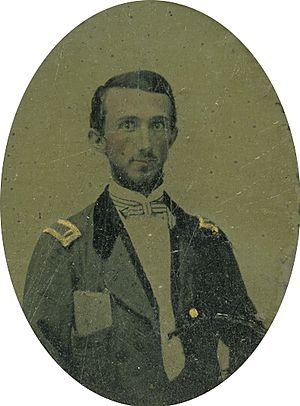Giles Buckner Cooke facts for kids
Giles Buckner Cooke (1838-1937) was an important person in American history. He was a soldier, a teacher, and a church leader. He fought as an officer for the Confederacy during the American Civil War.
Cooke is most famous for working closely with General Robert E. Lee. This happened during the Siege of Petersburg and the final parts of the war. After the war ended, he became a teacher and then a priest. When he passed away in 1937, he was the last person alive who had served on General Lee's personal team.
Contents
Giles Cooke's Life Story
His Time in the Civil War
Giles Buckner Cooke was born in Portsmouth, Virginia on May 13, 1838. In 1855, he started studying at the Virginia Military Institute (VMI). His school records show he sometimes broke rules by leaving the school without permission. Once, he was even kicked out but later allowed back in.
Cooke graduated from VMI in 1859. In April 1861, he joined the Virginia state army. Just four days later, he moved to the Confederate States Army. His past school record did not stop him from serving as an officer.
Serving in the Confederate Army
During the war, Cooke served in important roles. He fought in both Virginia and the western parts of the country. He first worked for General Philip St. George Cocke and General P. G. T. Beauregard. Later, he joined the staff of General Braxton Bragg.
Cooke was with General Bragg at the Battle of Shiloh. During this time, he saved the life of a soldier. General Bragg had ordered the soldier to be shot for breaking a rule, but Cooke stepped in to help.
In August 1862, Cooke left Bragg's team. He took on different jobs in Virginia and Florida. In October 1864, he became a major. He was assigned to General Lee's personal staff. He helped Lee during the Siege of Petersburg.
Cooke tried to help Lee during the final retreat from Richmond. However, he was hurt on April 6, 1865, at the Battle of Sailor's Creek. General Lee surrendered his army just three days later, on April 9, 1865. This meant Cooke returned to his life as a civilian.
His Work in the Church and Education
Cooke became a Christian in July 1861. This happened after he got very sick early in his army service. His personal diary shows that he tried to help others, like the soldier he saved, because of his Christian beliefs.
After the war ended in April 1865, Cooke went back to Petersburg, Virginia. He began to study to become a teacher and an Episcopal priest. He chose to focus on educating African-American children. He quickly took on leadership roles in this field.
Leading Schools for Children
From 1867 to 1868, Cooke led a separate Sunday school for African-American children. This school was connected to St. Paul Episcopal Church in Petersburg. Then, he became the principal of Petersburg's Elementary School #1. This school was also for black children. He worked there from 1868 to 1871. Elementary School #1 is believed to be the first public school for African-Americans in Virginia.
Cooke also continued his religious journey after the war. In 1871, he became a deacon in the Episcopal Church. At this time, he left public school education. From 1871 to 1885, he started several private schools for African-Americans. All of these schools were in Petersburg and linked to the Episcopal church.
In 1873, he was named a rector, which is a church leader. He became a priest in 1874. From 1885 to 1917, Cooke served in many church and education leadership roles. He worked in Maryland, Kentucky, and Virginia. In 1898, he was named a dean. He finished his service as the rector of All Saints Episcopal Church in his hometown of Portsmouth, Virginia, from 1915 to 1917. He passed away on February 4, 1937, at his home in Mathews County, Virginia.
Cooke's Legacy
As a priest, Giles Cooke was married two times. His first wife was Martha Southall Cooke. They were married from 1870 to 1894 and did not have children. In 1898, Cooke married Sarah Grosh. They had three children together, including his son John Warren Cooke.
In his later years, Cooke received many honors. These honors recognized his role as a church leader and as one of the last surviving senior officers from the South. He was named the chaplain general of the Confederate Memorial Association. He also became the assistant chaplain general of the United Confederate Veterans.
Cooke often gave interviews to historians, like Douglas Southall Freeman. He was seen as a living connection to General Robert E. Lee and his military team. Cooke kept a diary throughout the Civil War. He also collected many personal papers. These important historical documents are now kept at the Virginia Historical Society in Richmond.


